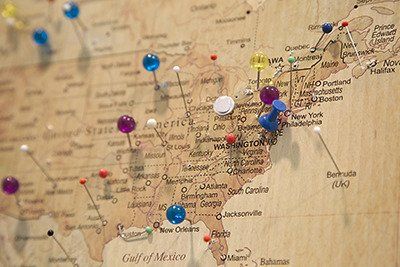For the most part, your advance directive and powers of attorney will be valid in another state. However, not all private and public entities will be comfortable taking action based on these estate planning documents from another state. Therefore, you may need to speak with a qualified attorney to create a new document in your new state or make other special arrangements.
If someone creates an estate plan, it will likely include powers of attorney as well as an advance directive (also known as a living will). These documents make it possible for others to act on your behalf or carry out your wishes when you are unable to.
But for the most part, these documents are created subject to state law. Their enforcement and provisions are also subject to state law. But what happens when you try to use a power of attorney in State A when it was created and designed for use in State B? With the mobility of today's society, this is a very common concern for anyone creating an estate plan.
But before we answer this question, let's have a brief civics lesson about laws from different sovereigns.
Federalism and the Full Faith and Credit Clause of the Constitution
Federalism is a form of government where there are two sovereigns. One is at the general, or federal, level while the other is at a more local level, such as a state. In the United States, citizens are subject to at least two sets of laws: federal and state.
Under the Constitution, certain powers are reserved for the federal government and certain powers are reserved for the states. Creating and enforcing powers of attorney or living wills fall under state jurisdiction. It doesn't have to be this way, but that's the current framework.
Our Constitution also has something called the Full Faith and Credit Clause. This basically means that court judgments, contracts and legal documents will (for the most part) be honored in any other state as long as it was properly created and does not directly conflict with the specific state's laws. Generally speaking, the Full Faith and Credit Clause will apply to powers of attorney and living wills.
But there's the law - and there's how the real world works. This means that one state's advance directive or power of attorney won't always be accepted by everyone else in another state, even if the law says it should.
Using a power of attorney across state lines
In most cases, your powers of attorney for health care and finances will be valid in a state that's different from the state in which it was created. But there are a few exceptions to this rule of thumb.

First, for State B to honor the power of attorney made in State A, State A may need to have the same (or more stringent) execution requirements. For example, State B might require two witnesses plus notarization for a valid power of attorney. But State A only requires two witnesses. It's possible that State B will not enforce the power of attorney from state A because it wasn't created with a process that meets State B's execution requirements.
Second, private and public institutions may not accept an out-of-state power of attorney. A bank in Michigan, for instance, might not have any idea about powers of attorney from New Mexico. So if you tried to take a New Mexico power of attorney into a Michigan bank, they might not comply with it. It may be because they're simply not comfortable accepting a document they have no familiarity with.
Using an advance directive across state lines
Advance directives (living wills), which express your end-of-life treatment preferences, are similar to powers of attorney in that they will usually be acceptable in a new state. Most states also have laws on their books that specifically accept out-of-state living wills as valid. But not all states do.
Additionally, even if a state accepts an advance directive from another state, it may only enforce its provisions to the extent it does not contradict its own state laws.
One solution has been to create a type of advance directive that meets the requirement of all 50 states and Washington, D.C. One example of this attempt was with the Uniform Health-Care Decisions Act (UHCDA). As long as an advance directive was made pursuant to the UHCDA's requirements, it would be valid in any state that adopted the UHCDA. Unfortunately, only a handful of states have adopted this law.
How to create an estate plan when moving to a new state
The best thing to do is speak with an attorney in your new state concerning your existing advance directive and power of attorney. Most likely, the attorney will recommend that you create a new power of attorney or advance directive in a new state. Even if this isn't technically required, it's the safest way to go about making sure your wishes are honored. There's no need to give a bank, health care provider or other organization an excuse to ignore your living will or power of attorney.
|
States that have adopted the Uniform Health-Care Decisions Act |
|
|---|---|
| State | Year Adopted |
| Wyoming | 2005 |
| Alaska | 2004 |
| Hawaii | 1999 |
| Mississippi | 1998 |
| Delaware | 1996 |
| Maine | 1995 |
| New Mexico | 1995 |
Creating an estate plan that's honored in two or more states
This is where things will get tricky and what you need to do will depend on not only your new state, but your home state, too. In some situations, your original advance directive or power of attorney will be enforceable in both states without issue. In other situations, you may need to make special advanced arrangements with the relevant organization that may need to comply with your advance directive or power of attorney. Regardless of what you need to do, speaking to an attorney in each state is critical.
One thing you shouldn't do is create two estate planning documents unless your attorney tells you to do so. This is because having two living wills, for instance, might not be possible. The new living will might revoke the earlier one. Or they will not both contain identical language and the differences could create ambiguity that makes their enforcement complicated or impossible.



